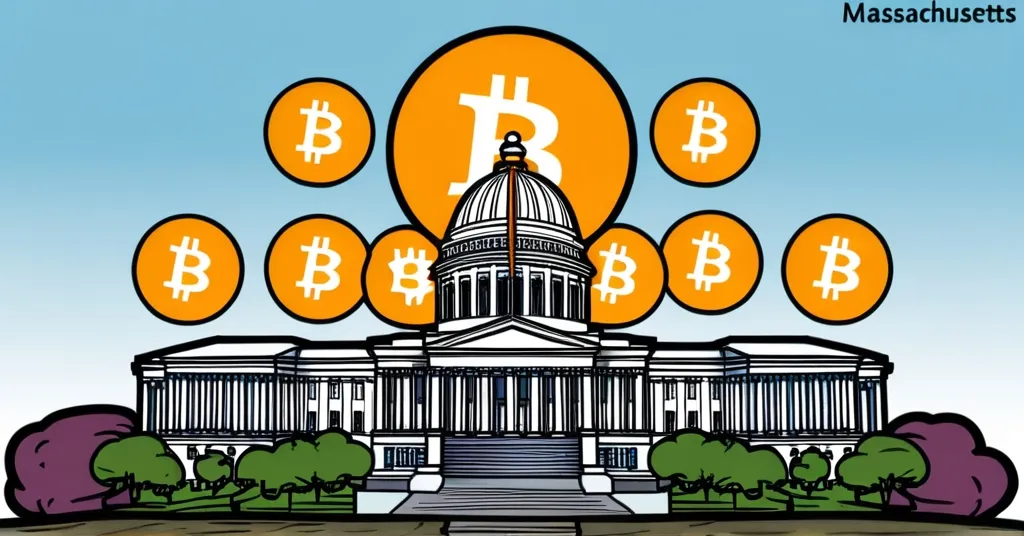Massachusetts Joins Eight States Proposing Bitcoin Reserve Law

Massachusetts Leads the Charge: Eighth State to Propose Bitcoin Reserve Law
In a move that could reshape the financial landscape, Massachusetts has become the eighth U.S. state to propose a Bitcoin reserve law, joining a growing trend of states recognizing cryptocurrency as a potential state asset.
- Eighth state to propose Bitcoin reserve law
- Bill introduced by State Senator Peter Durant
- 15 states working on similar legislation
State Senator Peter Durant introduced the Strategic Bitcoin Reserve bill, aiming to solidify Massachusetts’ position in the growing cryptocurrency market. This legislative push mirrors actions in states like Texas, Wyoming, Oklahoma, New Hampshire, Ohio, and Pennsylvania, which are all exploring the potential of Bitcoin as a state reserve asset. A Bitcoin treasury, or reserve, refers to a state-held reserve of Bitcoin for financial stability and potential future use.
Texas, in particular, stands out with 27 Bitcoin mining operations within its borders, showcasing a robust infrastructure that could support such financial strategies. This move by states is not isolated; it’s part of a larger national conversation about the role of Bitcoin in the U.S. economy.
On the federal level, Senator Cynthia Lummis is pushing for changes that would allow the U.S. Treasury to hold Bitcoin. This advocacy at the national level complements the state-level initiatives, suggesting a coordinated effort to integrate Bitcoin more deeply into American financial systems. Lummis’ efforts highlight the growing acceptance of Bitcoin as a legitimate financial instrument, not just a speculative asset.
Industry leaders are also lobbying the incoming administration to prioritize crypto policies. David Sacks, leading a council of blockchain advocates, is at the forefront of these efforts. The push for an executive order on Bitcoin could signify a monumental shift in U.S. policy towards cryptocurrencies. Sacks’ involvement underscores the influence of blockchain advocates in shaping future crypto policies under the Trump administration.
The timing of these legislative proposals is no coincidence. The widespread interest in Bitcoin and blockchain technology is seen as an opportunity to influence the new administration’s policies from the get-go. This reflects the philosophy of effective accelerationism, a belief in rapid technological advancement to drive societal change, which aligns with the ethos of Bitcoin and decentralization.
While the optimism surrounding Bitcoin’s potential is palpable, it’s crucial to acknowledge the challenges and risks involved. Regulatory hurdles, the volatility of cryptocurrency markets, and the need for robust security measures are all factors that states and federal lawmakers must navigate. Critics argue that these state-level initiatives are premature or speculative, given Bitcoin’s volatility and the lack of comprehensive federal regulation. However, proponents see this as an essential step towards a more decentralized and resilient financial system, embodying the principles of freedom and privacy that Bitcoin champions.
Massachusetts isn’t just jumping on the Bitcoin bandwagon; they’re leading the charge! But let’s not forget the nuances of the crypto world—there’s a place for altcoins and other blockchains too, each filling unique niches in this financial revolution. While Bitcoin maximalists might cheer these developments, it’s important to recognize the broader ecosystem’s role in driving innovation and disruption.
Key Questions and Takeaways
What is the significance of Massachusetts proposing a Bitcoin reserve law?
Massachusetts joining seven other states indicates growing acceptance of Bitcoin as a legitimate financial asset, reflecting broader national interest.
Who introduced the Strategic Bitcoin Reserve bill in Massachusetts?
State Senator Peter Durant introduced the bill.
How many U.S. states are working on Bitcoin reserves legislation?
15 U.S. states are reportedly working on Bitcoin reserves legislation.
Which other states have formally introduced Bitcoin reserve laws?
Wyoming, Oklahoma, New Hampshire, Ohio, and Pennsylvania have formally introduced Bitcoin reserve laws.
What role does Senator Cynthia Lummis play in the context of Bitcoin legislation?
Senator Cynthia Lummis is advocating for changes in the U.S. Treasury to allow the holding of Bitcoin, indicating support at the federal level.
Who is David Sacks and why is he significant in this context?
David Sacks leads a council of blockchain advocates, suggesting his influence in shaping crypto policies under the Trump administration.
What are the potential implications of states passing Bitcoin reserve laws before federal legislation?
States passing Bitcoin reserve laws could set a precedent and pressure federal lawmakers to consider similar policies, potentially leading to widespread acceptance of Bitcoin as a reserve asset.



